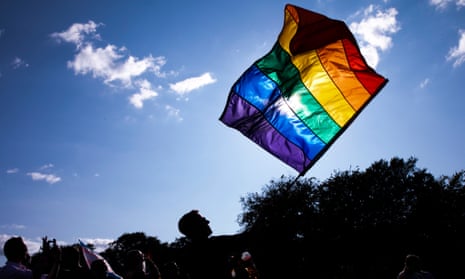New Zealand’s National party promised grassroots activists that they would vote in favour of banning conversion practices, but last month they were the only party to vote against a bill doing just that. We, the queer community, were blindsided by their new position and hurt by the numerous National MPs who had promised us we could trust them to be allies.
National party leader Judith Collins maintains that the party supports a ban on gay conversion practices but is concerned that the current bill could criminalise parents who counsel their children and has labelled the proposed bill “anti-parents”. As a survivor of conversion practice, I believe National’s position is anti-children.
They are correct to say this bill is telling parents how to parent their children. But it is also true that the law already tells people how to be parents. The anti-smacking laws were introduced in New Zealand so stop parents from hitting children. A study by the Family Acceptance Project, a US-based initiative that helps families support their LGBTQ children, found that rates of attempted suicide were more than twice as high among LGBT youth who had been subjected to conversion practices. Medical bodies in Aotearoa and worldwide have declared conversion practices ineffective, unethical and harmful.
The anti-conversion practices law extends protections to prevent psychological harm. Some of New Zealand’s biggest churches have declared their opposition to the ban, claiming that the bill limits the freedom of parents to counsel their children.
The bill is clear that advising your children not to take puberty blockers or having a conversation with them won’t be criminalised. The bill requires a practice. Advising your children or having a conversation does not meet the definition of a practice and the threshold for criminalisation. The bill does not criminalise parents for failing to provide puberty blockers for their children, either. The bill criminalises acts rather than omissions, and failing to do something is an omission.
Churches also claim that the bill would limit their freedom to provide prayer. But the bill states that the expression only of a religious principle or belief made to an individual that is not intended to change or suppress the individual’s sexual orientation, gender identity or gender expression will not be criminalised. Claiming that “gays will go to hell” would not meet the threshold for criminalisation. Additional requirements include the intention to change or suppress the individual’s sexual orientation, gender identity or gender expression. Religious groups have a significant leeway to express their anti-queer views if that’s what they choose, and it is utterly false to argue that this bill will abrogate prayer or freedom of speech.
Some of the same church groups opposed same-sex marriage in the name of protecting children. In reality, they are using children to put forward their own agenda.
People won’t come out and say “I am homophobic”, so they are forced to look for other arguments in a book that says snakes can talk, homosexuality is a sin and marriage is traditionally between a man and a woman. Well, traditionally, voting was only for white men.
Things have changed, and so should we.
As a former churchgoer, I am familiar with these statements. They often start with showing pretend support for the queer community before launching into an attack on our existence. This presents them as reasonable people rather than who they are: religious bigots.
There is a fine line between religious freedom and religious bigotry. Conversion practice is bigotry. Religious leaders have weaponised the relationship queer people have with God and manipulated us into thinking God will hate us if they don’t change.
God doesn’t care if you are gay or trans; being a decent human will suffice. As for these religious leaders, they have driven queer people into a life of pain, misery and death, and God will never forgive them for it.
Banning conversion practices does not criminalise parents trying to do their best or limit freedom of religion. It sends a message to all queer people that they are valid. Every story of conversion practices ends with a queer person questioning whether it is still worth living. We are lucky some choose to stay, but many don’t. The only time freedom of religion is invoked in New Zealand is in the name of bigotry and hatred.
Conversion practices are not about praying the gay away or fixing the trans. It is about psychologically and physically torturing queer people. No person, no parent, no pastor has the right to change or suppress queer people. It is time to end conversion practices in Aotearoa New Zealand.
Shaneel Lal is the founder of the Conversion Therapy Action Group, which works to end conversion practices in Aotearoa New Zealand
